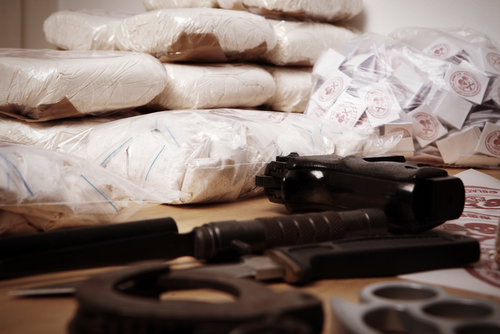
Representatives of the United States’ main border protection organization were resolute on Thursday in a call to Congress not just for information, but for modernized equipment and continued cooperation with southern neighbors against drug cartels.
These concerns were laid plain at a meeting of the House Homeland Security Committee’s Border and Maritime Security Subcommittee gathered to assess cartels’ threats to the United States.
“They will adapt, innovate and just plain outsmart us if we do not leverage the full power of the government to focus on countering the cartel network,” U.S. Rep. Martha McSally (R-AZ), subcommittee chairwoman, said in her opening statements.
It would come to echo the sentiments of her witnesses. Categorizing their enemies as innovative and incredibly resourceful, the meeting was awash in tales of drug cannons, doors cut by blowtorches into border walls and other creative means of transportation the United States’ myriad protection agencies are cooperating to try and stop.
“They can build in a ditch in a jungle in Ecuador, a craft capable of traveling the distance from Florida to Washington state,” said Vice Admiral Charles Ray, deputy commandant for operations at the U.S. Coast Guard, in one colorful example.
Recent reports have suggested that the United States is slightly more than 50 percent effective at stopping people from entering the nation illegally, and narcotics continue to be smuggled across the border.
But while the problems are formidable, the witnesses agreed that cooperation with international counterparts has been a consistent source of gains in the war on drugs.
When asked by U.S. Rep. Filemón Vela (D-TX) to describe those efforts and what was needed to make them more successful, Matt Allen, assistant director of Homeland Security Investigations at the U.S. Department of Homeland Security (DHS), kept it simple. “In a word: good,” Allen said. “I would expand on it by saying: growing.”
What was needed, he said, was to grow relations with Mexican authorities and law enforcement, and that bi-national cooperation had been seen to affect not just Cartel activities on the ground, but their leadership as well.
While some of the representatives questioned the idea of working with corrupt or compromised counterparts across the border, the consensus was that the results outweighed the risks, and could be minimized with proper information and ground support.
“Building the capacity of Mexican agencies, increasing the rule of law in Mexico is a big part of that,” Allen said. “Our role is a liaison role.”
What’s more, he stressed that corruption is an aspect of the job that hits both sides of the border.
“The reality is that U.S. law enforcement is not immune to corruption,” Allen said. “Anecdotally, it’s at a much lower level in the U.S. than in Mexico, but we do face the insider challenge. It’s something we have to focus on and acknowledge.”
Information was a topic of discussion from questioners and witnesses. While all parties involved stressed the cooperation of agencies at present, Allen said the problem is processing information into evidence.
“No one’s going to turn down any more assistance or information,” Allen said. “The ability to illuminate the network and connect people and events in ways we can use in prosecution. There’s always been a problem turning intelligence to evidence.”
One notable point of tension did emerge in the meeting, when Rep. Nanette Barragán (D-CA) hit out at the current administration’s plans to build a wall between the United States and Mexico, asking if it would weaken relations between the two countries.
“Certainly we have enjoyed a good relationship with the government of Mexico,” said Chief Paul Beeson at DHS’s Joint Task Force for the West and Arizona. “That relationship has gotten better and better and better throughout the years. We engage with local authorities on a regular basis. We both want a secure border. We look forward to a continued relationship with Mexico.”
It wasn’t enough for Barragán.
“I want to make sure you answer my question,” Barragán said. “What will the impact be if there is less cooperation between the U.S. and Mexico? A lot of the rhetoric we’re hearing from this administration only leads to less cooperation.”
While Allen admitted such developments would hurt cooperation in the short term, he said that agencies have weathered similar storms in the past.
In contrast, Luis Arreaga, principal deputy assistant secretary for the Bureau of International Narcotics and Law Enforcement Affairs with the U.S. Department of State, made plain the critical nature of a cooperative approach to border control.
“Naturally, we work on the basis that partner governments want to work with us,” Arreaga said. “Without it, we wouldn’t be able to accomplish much.”




